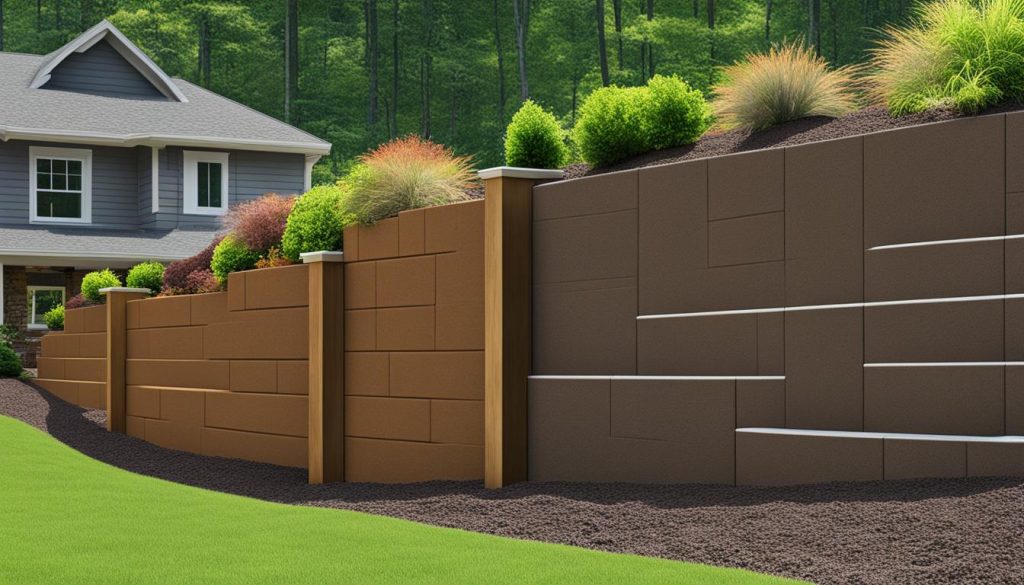Welcome to our comprehensive guide on understanding the cost associated with building a retaining wall in Canada. If you are planning to build a retaining wall, it is essential to have a clear understanding of the expenses involved to ensure a successful and cost-effective project. In this section, we will discuss various factors that influence the cost and provide helpful tips on how to budget effectively for your project.
Building a retaining wall can be a significant investment, but it is important to remember that it is also a long-term investment in your property’s stability and value. To ensure your retaining wall is built to the highest standards while staying within your budget, it is crucial to have a solid understanding of the cost factors involved.
Whether you are building a retaining wall for functional or aesthetic purposes, the cost will depend on several factors. These include the size and height of the wall, the materials used, the site conditions, and any additional features or customization options you may choose.
At first glance, the cost of building a retaining wall may seem overwhelming. However, by following our guide and tips, you can create a realistic budget for your project and ensure a successful outcome. Let’s get started!
Factors Affecting Retaining Wall Cost
As we mentioned earlier, several factors can impact the cost of building a retaining wall. Understanding these factors will help you plan your budget accordingly and avoid any unexpected expenses. Let’s take a closer look at the most significant factors affecting retaining wall cost.
Size and Height of the Wall
The size and height of the wall are the most significant factors affecting the cost of your project. A higher and longer wall will require more materials and labor, resulting in a higher cost. Additionally, if you have uneven terrain or require a wall with complex angles, the cost will increase even more.
Materials Used
The type of material you choose for your retaining wall will also impact the cost. While basic materials like concrete blocks are more affordable, custom materials like natural stone or brick can be more expensive but provide a higher-end look. Additionally, if you choose premium quality materials, the cost will increase even more.
Site Conditions
The condition of the site where the retaining wall will be built is another crucial factor. If the site has challenging terrain or requires extensive excavation work, the cost will increase. Similarly, if the site has narrow access or slopes, the cost will increase due to the need for additional equipment and labor.
Additional Features or Customization Options
Finally, adding extra features or customization options to your retaining wall project will also impact the cost. For instance, adding a drainage system, lighting, or decorative elements can increase the overall cost. Similarly, if you require curves, steps, or terraces in the wall, the cost will increase due to the additional labor and materials required.
Now that you understand the most significant factors affecting the cost of your retaining wall project, you can plan your budget accordingly and avoid any unpleasant surprises down the road.
Estimating the Cost of Your Retaining Wall
Now that you understand the factors that affect the cost of building a retaining wall, it’s time to estimate the actual expenses. One of the most important steps in budgeting for your project is obtaining quotes from contractors. Contact at least three reputable contractors and request a written estimate.
When reviewing the estimates, make sure to consider both labor and material costs. Factors such as the size and height of the wall, the materials used, and any additional features or customization options will affect the price. Keep in mind that selecting higher-quality materials will usually result in a higher cost, but may also increase the longevity and durability of your retaining wall.
It’s also crucial to factor in any additional expenses such as permits or engineering fees. Check with your local municipality to determine whether a permit is required for your retaining wall project. In some cases, a permit may be necessary if the wall exceeds a certain height or is located in a particular area.
Obtaining Multiple Quotes
Getting multiple quotes from different contractors will help you compare and choose the best option for your budget and needs. However, be wary of lowball estimates, as they may indicate that the contractor is cutting corners or using lower-quality materials.
Remember, the cost of building a retaining wall can vary widely depending on the factors we discussed earlier. Therefore, it’s essential to obtain detailed written estimates from multiple contractors to ensure that you are getting a fair and accurate price.
By following these steps, you can create a realistic budget for your retaining wall project and avoid any unexpected expenses. Remember, proper planning and budgeting are key to achieving a successful and long-lasting retaining wall.
Hiring a Professional Retaining Wall Contractor
Building a retaining wall is not an easy task, and it is important to hire a professional contractor to ensure the job is done right. Here are some tips to help you choose the right contractor for your project.
Choose a Licensed and Insured Contractor
It is important to choose a contractor who is licensed and insured, as this provides a level of protection for you and your property. A licensed contractor has met certain standards and requirements, while insurance protects you in case of accidents or damage during the project.
Check their References and Portfolio
Before hiring a contractor, ask for references and check their portfolio to see examples of their previous work. This will give you an idea of their experience and expertise in building retaining walls.
Obtain Detailed Written Estimates
It is important to obtain detailed written estimates from several contractors, as this will help you compare prices and services. Make sure the estimate includes all costs, such as materials, labour, permits, and any additional fees.
Communicate Your Requirements and Expectations
Effective communication with your contractor is crucial to ensure the success of your project. Make sure you clearly communicate your requirements and expectations, and ask questions if anything is unclear. A professional contractor should be able to provide you with clear and concise answers.
By following these tips, you can hire a professional retaining wall contractor that will ensure the quality and durability of your retaining wall, provide you with peace of mind, and help you stay within your budget. If you have any questions, our team is always happy to help.
FAQ
What factors affect the cost of building a retaining wall?
Several factors can impact the cost of building a retaining wall, including the size and height of the wall, the materials used, the site conditions, and any additional features or customization options you choose.
How can I estimate the cost of my retaining wall project?
To estimate the cost of your retaining wall project, it’s important to obtain quotes from contractors, consider labor and material costs, and factor in any additional expenses such as permits or engineering fees.
Do I need to hire a professional retaining wall contractor?
Yes, hiring a professional retaining wall contractor is crucial for the quality and durability of your wall. They have the expertise and specialized skills required for this type of construction. Make sure to choose a licensed and insured contractor, check references and portfolios, and obtain detailed written estimates.

